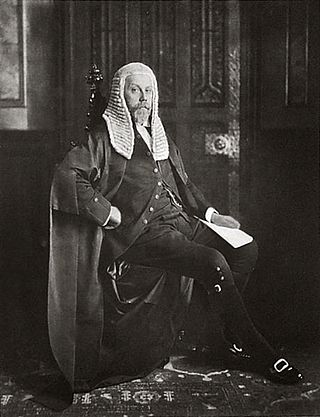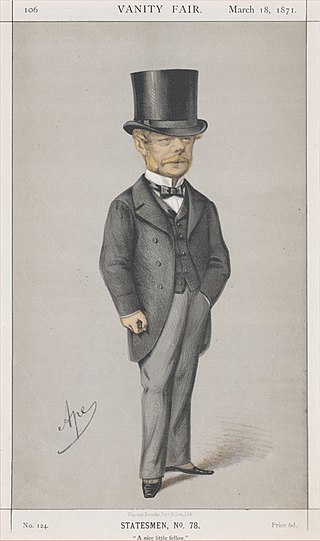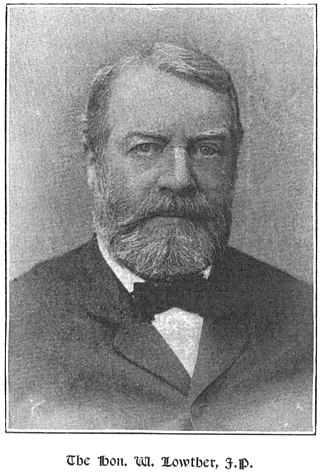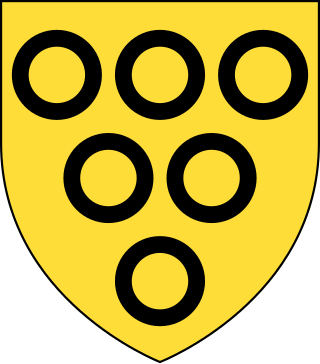
Earl of Lonsdale is a title that has been created twice in British history, firstly in the Peerage of Great Britain in 1784, and then in the Peerage of the United Kingdom in 1807, both times for members of the Lowther family.

Earl of Iddesleigh, in the County of Devon, is a title in the Peerage of the United Kingdom. It was created in 1885 for the Conservative politician Sir Stafford Northcote, 8th Baronet, of Pynes in the parish of Upton Pyne near Exeter in Devon and lord of the manor of Iddesleigh, 28 miles north-west of Pynes. He served as President of the Board of Trade, Secretary of State for India, Chancellor of the Exchequer, First Lord of the Treasury and Foreign Secretary and was Joint Leader of the Conservative Party from 1881 to 1885. Northcote was made Viscount St Cyres, of Newton Saint Cyres in the County of Devon, at the same time he was given the earldom. This title is also in the Peerage of the United Kingdom.

Viscount Ullswater, of Campsea Ashe in the County of Suffolk, is a title in the Peerage of the United Kingdom. It was created in 1921 for James Lowther upon his retirement as Speaker of the House of Commons. He was the eldest son of the Hon. William Lowther, third son of the Hon. Henry Lowther, second son of William Lowther, 1st Earl of Lonsdale. The first Viscount lived to the age of 93, and was pre-deceased by both his eldest son the Hon. Christopher Lowther, a Conservative politician, and his eldest son's eldest son John Arthur Lowther (1910–1942), the title being inherited by his seven-year-old great-grandson, the second and current Viscount, in an extremely rare instance of a great-grandson succeeding his great-grandfather in a peerage. The second Viscount held office in the Conservative administrations of Margaret Thatcher and John Major and since 2003 he has been one of the ninety elected hereditary peers that remain in the House of Lords after the passing of the House of Lords Act 1999.

John Lowther, 1st Viscount Lonsdale, PC FRS, known as Sir John Lowther, 2nd Baronet, from 1675 to 1696, was an English politician.
The Comptroller of the Household is an ancient position in the British royal household, nominally the second-ranking member of the Lord Steward's department after the Treasurer of the Household. The Comptroller was an ex officio member of the Board of Green Cloth, until that body was abolished in the reform of local government licensing in 2004. In recent times, a senior government whip has invariably occupied the office. On state occasions the Comptroller carries a white staff of office, as often seen in portraits.

James Lowther, 1st Earl of Lonsdale was an English landowner and politician who sat in the House of Commons for 27 years from 1757 to 1784, when he was raised to the Peerage of Great Britain as Earl of Lonsdale.
This is a list of people who have served as Lord Lieutenant of Cumberland. From 1765 to 1974, all Lord Lieutenants were also Custos Rotulorum of Cumberland.
Below is a list of people who have served as Lord Lieutenant of Northamptonshire. Since 1735, all Lords Lieutenant have also been Custos Rotulorum of Northamptonshire. The lieutenancy included the Soke of Peterborough until 1965, when the Lord Lieutenant of Huntingdonshire became Lord Lieutenant of Huntingdon and Peterborough. This merged with the lieutenancy of Cambridgeshire and Isle of Ely in 1974, forming the jurisdiction of the present Lord Lieutenant of Cambridgeshire.
This is a list of people who have served as Lord-Lieutenant of Westmorland. The office was abolished on 31 March 1974 and replaced by the Lord Lieutenant of Cumbria. From 1751 to 1974, all Lord Lieutenants were also Custos Rotulorum of Westmorland.

Gerard James Noel PC, DL, JP, styled The Honourable Gerard Noel from birth, was a British Conservative politician.

William Lowther, 1st Earl of Lonsdale, KG, also known as Sir William Lowther, 2nd Baronet, of Little Preston, from 1788 to 1802, and William Lowther, 2nd Viscount Lowther, from 1802 to 1807, was a British Tory politician and nobleman known for building Lowther Castle.
Sir John Lowther, 1st Baronet of Swillington, Yorkshire was an English landowner and Member of Parliament.

William Lowther JP DL was a British diplomat and Conservative politician who sat in the House of Commons from 1868 to 1892.
Lowther may refer to:
James Hugh William Lowther, 7th Earl of Lonsdale, was a British peer.

Charles Noel Noel, 1st Earl of Gainsborough, known as Charles Edwardes until 1798, as Charles Noel between 1798 and 1823 and as the Lord Barham between 1823 and 1841, was a British peer and Whig politician.

The Lowther baronetcy, of Whitehaven in the County of Cumberland, was created in the Baronetage of England on 11 June 1642 for Christopher Lowther; he was the younger brother of Sir John Lowther, 1st Baronet, of Lowther.

The Lowther baronetcy, of Little Preston in the County of York, was created in the Baronetage of Great Britain on 22 August 1764 for Reverend William Lowther. He was the great-grandson of Sir William Lowther, and the nephew of Sir William Lowther, 1st Baronet, of Swillington. He was succeeded by his eldest son, the 2nd Baronet. In 1802 he succeeded his third cousin once removed James Lowther, 1st Earl of Lonsdale, who was a great-grandson of Sir John Lowther, 1st Baronet, of Lowther, as 2nd Viscount Lowther according to a special remainder in the letters patent. In 1807 the earldom of Lonsdale was revived in his favour.

The Lowther baronetcy, of Swillington in the County of York, was created in the Baronetage of the United Kingdom on 3 November 1824 for John Lowther. He was the second son of Sir William Lowther, 1st Baronet, of Little Preston, and brother of William Lowther, 1st Earl of Lonsdale (1807). His seat was Wilton Castle.